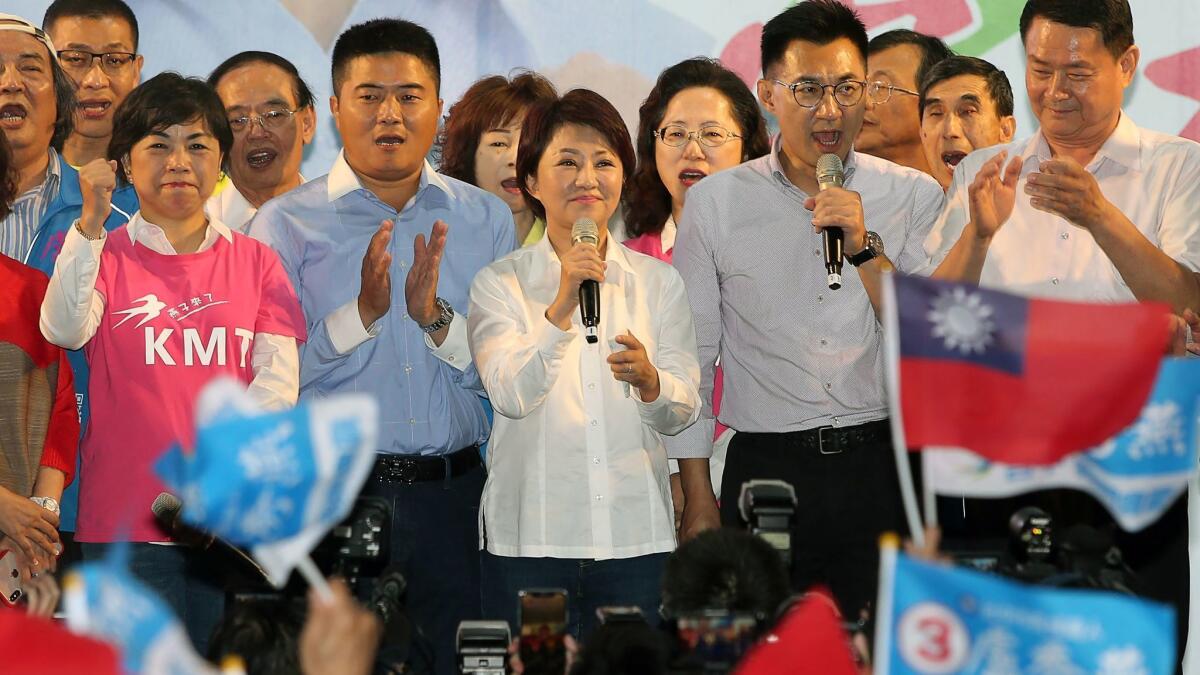China-friendly party wins midterm elections in Taiwan, a test before presidential contest in 2020

Reporting from TAIPEI, TAIWAN — Taiwan’s China-friendly chief opposition party won most major seats in midterm local elections Saturday, challenging the president’s two years of cold relations with the more militarily powerful and increasingly angry Beijing.
Nationalist Party candidates won 15 of Taiwan’s 22 mayoral and county magistrate seats, reversing the ruling party’s lead that it took in 2014 on its way to the presidency two years later. Hours after polls closed, President Tsai Ing-wen resigned as the party’s chairwoman and her premier offered to quit.
While voters picked candidates for a list of reasons, from colorful personalities to their role in completing local infrastructure projects, analysts say the ruling Democratic Progressive Party’s tense relations with China weighed on overall sentiment.
“We know the Democratic Progressive Party wasn’t going to do well but not to such an extent,” said Raymond Wu, managing director of Taipei-based political risk consultancy e-telligence.
“You look at any number of polls, and no one wants unification (with China) at this point, but we want a government that can manage cross-Strait relations,” Wu said, referring to China-Taiwan ties. “It’s business 101, meaning you use limited resources to create the best outcome.”
Tsai does not accept Beijing’s dialogue condition that both sides belong to a single China, an extension of the Communist leadership’s claim to sovereignty over the island.
Her refusal reassures voters worried about a takeover by China, but it has stopped any talks and led China to step up pressure against Tsai’s government. Many Taiwanese still value economic relations and worry how far the pressure will go.
China periodically flies military aircraft near Taiwan, for example, and persuades Taipei’s diplomatic allies to switch allegiance. The two sides have been separately ruled since the 1940s, when Chiang Kai-shek’s Nationalists based their government in Taiwan after a civil war with Mao Zedong’s Communists.
The Nationalists, or KMT, advocate engaging China on Beijing’s condition. The 2008-2016 government of Nationalist ex-president Ma Ying-jeou signed more than 20 agreements with Chinese officials, covering mainly investment, trade and transit.
But Ma eventually got too close to China for a lot of voters’ comfort, precipitating his party’s election losses in 2014 and 2016.
Nationalist Party Chairman Wu Den-yih said Saturday his camp would keep advocating stronger relations with Beijing based on the one-China prerequisite for dialogue. “We hope the two sides will soon go back to a peaceful and stable trend in relations,” he told reporters at the party headquarters after a victory speech.
Perceptions of low wages, slow economic growth and the Democratic Progressive Party’s sometimes testy public relations also turned voters away, scholars and candidates for office said.
“When it comes to the government’s communication style, there are people who have criticized them as being too arrogant,” said Gratiana Jung, senior political researcher with the Yuanta-Polaris Research Institute think tank in Taipei. “I think what most people care about most is that things are corrected within the government.”
Tsai’s party was particularly stung in the 2.8 million-population port city Kaohsiung, one of its traditional strongholds in southern Taiwan. The Nationalist victor there, populist former legislator Han Kuo-yu, took 53.8% of the vote. Nationalists also took two counties held before by independents, though Taipei’s independent mayor narrowly won a second term.
Tsai said she stepped down as party chair, though not as president, to take “full responsibility” for the election results.
“I want to express here my very sincere apologies,” she said in a statement. “As for the display of public opinion, we will of course do a deep review, but one round of failures won’t make us stop our stride.”
In another setback for the ruling party, voter majorities passed two advisory ballot measures Saturday saying the civil code should restrict marriage to one man and one woman. They supported a “different process” to protect same-sex unions.
The Constitutional Court had ruled in May 2017 that legislators must legalize same-sex marriage within two years, a victory for LGBTQ couples who wanted joint legal custody over children and shared insurance benefits. It was also a first order of its kind for Asia. The ruling party-dominated parliament had already crafted bills to recognize same-sex marriage.
“The government has its freedom to pass laws, but if the referendum says one man and one woman, what choice does it have?” asked referendum proponent Chen Ke, a Catholic pastor in Taiwan and part of the organized opposition to same-sex marriage.
The ballot measures should set “direction” for the legislature but not supersede the Constitutional Court order, a justice ministry official said Friday.
Jennings is a special correspondent.
More to Read
Sign up for Essential California
The most important California stories and recommendations in your inbox every morning.
You may occasionally receive promotional content from the Los Angeles Times.










